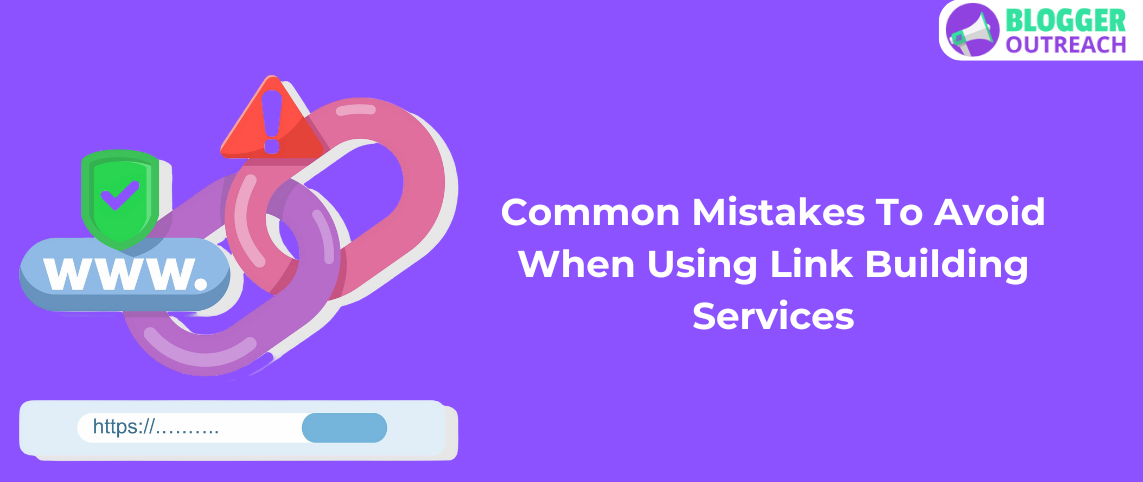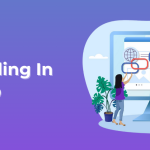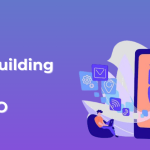Table Of Content
- 1 Mistake – 1: Misunderstanding What Link Building Really Means
- 2 Mistake – 2: Choosing Cheap Over Quality Services
- 3 Mistake – 3: Ignoring The Relevance Of Backlinks
- 4 Mistake – 4: Opting For Services Who Offer Black-Hat Tactics
- 5 Mistake – 5: Ignoring No-Follow vs. Do-Follow Links
- 6 Mistake – 6: Disregarding User Experience In Link Placement
- 7 The Bottom Line
Link building is one of the most important aspects of SEO. It helps search engines understand the credibility and relevance of a website. High-quality backlinks can also improve your site’s authority, boost rankings, and drive organic traffic. However, building quality links isn’t easy.
If You Want To Make The Most Out Of It, You Have To –
- Find relevant websites that are in the same niche as your business.
- Do manual outreach and attract the right bloggers.
- Build relationships with the owners of authority websites.
- Offer excellent quality content.
- Avoid black-hat techniques and maneuvering through budget limitations.
This is where link-building services, like BloggerOutreach, come in. They offer their expertise and resources to secure valuable links for your websites and more.
However, while these services are great on their own accord – they might not be suitable for what you’ve envisioned for your brand. So, if you’re not careful, you could end up wasting money, damaging your website’s reputation, or even getting penalized by Google.
This article highlights the most common mistakes businesses make when using link-building services—and, more importantly, how to avoid them.
Mistake – 1: Misunderstanding What Link Building Really Means
Many businesses think link building is just about getting as many backlinks as possible. But that’s far from the truth. It’s not about quantity but about the quality of the links, the strategy you are following, and how relevant your content is.

How Link-Building Helps Your Business (Source)
A: What Link Building Is (And Isn’t)
Link building is the process of getting other websites to link to yours. The goal is to improve your site’s authority and visibility on search engines. And this can be done when you are getting a link from a reputable, relevant website with lots of followers.
Here’s What Link Building Isn’t –
- It’s not a numbers game. So, building more links won’t necessarily get you better results.
- Automated link building or buying low-quality links may hurt your SEO.
- It’s not a quick fix and may take a lot of time and effort before presenting fruitful rewards.
B: Quality Links vs. Spammy Links
Smart engines, like Google and Bing, have become smart enough to spot the difference between a quality link and a spammy one.

Source: Ahrefs
Here’s How They Compare These –
| Quality Link | Spammy Link |
| Comes from a reputable, high-authority site | Comes from a low-quality, irrelevant site |
| Are contextually relevant to your content page | Seem out of place or random on the page |
| Placed naturally with your content | Placed in sidebars, footers, or “link farms” |
| Builds trust and SEO authority | Has a risk of getting penalized by Google |
Spammy links can be a shortcut to improving your website’s authority and offer a short-term boost to its traffic. However, they never pay off in the longer term. If you have built too many spammy links on your website, chances are Google might de-index from its directory soon.
C: How BloggerOutreach (BO) Can Help
At BO, we understand that effective link-building isn’t just about numbers – it’s about the strategy you’re following. That’s why we focus on quality over quantity to help your website get links from relevant, high-authority blogs and sites. Here’s how we do it –
- We secure links from trusted, high DA (usually 50 or over) websites.
- Every link is placed naturally within the content, not in footers or sidebars.
- Our team creates a tailored strategy that aligns with your industry and business goals.
- BO only uses ethical, white-hat techniques to avoid Google penalties.
Mistake – 2: Choosing Cheap Over Quality Services
When choosing a link-building services provider, going for a more affordable option might seem viable to most businesses. However, while it’s a smart strategy to save your money, it often leads to low-quality backlinks, wasted time, and potential penalties.
A: How To Identify Quality Link Building Services Providers?
Affordable link-building services usually cut corners. They may rely on spammy link farms, irrelevant websites, or automated tools that create unnatural backlinks.
So, how do you find agencies that believe in white-hat techniques? Here are a few pointers you should follow to spot the right link-building partner for your business –
- They build links that are relevant to your website and business.
- They have a great track record (look for case studies, reviews, and testimonials).
- Quality providers also focus on manual outreach to earn backlinks from trusted sites.
- They will offer clear and informative reports on how they’ve acquired each link. This may include link type, site details, and placement.
B: Red Flags To Watch Out For
Spotting the warning signs at the earliest can save you from making a bad investment. Here’s what you need to know about these –
- The promises of offering a guaranteed result.
- The usage of link farms and PBNs.
- They work with every business in a one-size-fits-all style.
- Low pricing seems too good to be true.
C: How BloggerOutreach (BO) Can Help
At BO, we focus on building links manually instead of automating the entire process. Our approach is simple – we prioritize relevance, authority, and transparency. Here’s how we do it –
- Manual Outreach – We build authentic relationships with high-quality websites and industry-specific blogs. No bots, no link farms — just real connections.
- Customized Strategy – We don’t believe in one-size-fits-all. Our link-building strategy is tailored to your business, ensuring every link has a purpose.
- Full Transparency – You’ll know exactly where your links come from. We provide detailed reports with full link data.
- Proven Results – Our clients have seen lasting SEO improvements. Our focus on relevance and authority drives long-term growth, not short-term wins.
Mistake – 3: Ignoring The Relevance Of Backlinks
Backlink relevance is one of the most important factors in Google’s ranking algorithm. Irrelevant backlinks can do more harm than good, no matter how many you have. Here’s why –
A: Why Link Relevance Matters?
Google, like any other search engine, prioritizes user experience. When backlinks come from sites that are contextually related to your niche, it signals to Google that your website is trustworthy and relevant. For example, if you are running a fitness blog, it’s important to get backlinks from health, wellness, and nutrition sites.

However, getting links from random, unrelated websites (such as gambling sites or tech blogs) might raise red flags in Google’s eyes. Search engines want to see a clear, logical connection between the source of the link and your website. Relevant links boost your authority and help you rank higher for industry-specific keywords.
B: How To Ensure Relevance When Selecting Link Sources?
There are three things you need to choose in order to ensure relevance when selecting a source for your backlinks. Here’s what you need to know about them –
- Check the Website’s Niche: Make sure that the website linking to you is in the same or a related industry. For example, if you are in eCommerce, try getting links from retail, shopping, or product review websites.
- Analyze the Content around the Link: Look at the context of the link placement. Does the surrounding content relate to your website’s topic? Contextual links within relevant content hold more value and offer more relevance to the blog.
- Review Site Authority and Traffic: High-traffic, authoritative websites in your industry send stronger signals to Google than low-traffic, off-topic sites. Tools like SEMrush and Ahrefs can offer assistance in this regard.
C: Consequences Of Irrelevant Backlinks
Irrelevant backlinks can negatively impact your website. Here’s how –
- Search engines, like Google, can see these links as an attempt to manipulate rankings, which might lead to penalties or de-indexing.
- Links from off-topic, low-quality websites can reduce your site’s perceived authority.
- When users click on an irrelevant backlink on a website, they might get confused by the content mismatch. This may lead to poor user experience.
D: How BloggerOutreach (BO) Can Help
At BloggerOutreach (BO), we specialize in building relevant backlinks that actually move the needle. Our approach is simple but effective:
- Industry-Specific Placements: We secure links from websites that match your niche. No irrelevant blogs or shady directories.
- Content-Driven Strategy: We prioritize contextual backlinks placed naturally within high-quality, relevant content.
- Thorough Vetting Process: Our team manually reviews each site to ensure it aligns with your industry and meets quality standards.
Mistake – 4: Opting For Services Who Offer Black-Hat Tactics
Shortcuts might seem in any form of digital marketing. However, it becomes even more evident in link building, as it usually takes quite some time before offering any positive outcome.
However, the problem is – black-hat tactics can do more harm than good.
Google, thanks to recent updates, has become smarter than ever, and they can easily spot unnatural link-building practices. Here’s what you need to know about it.
A: What Do Black-Hat Tactics Look Like?
Black-hat tactics are unethical methods used to manipulate search engine rankings. They violate Google’s guidelines and can lead to severe penalties. Some of these tactics can include –

An example of how black-hat SEO works (Source)
- Private Blog Networks (PBNs): A network of websites created solely to generate backlinks. These sites have no real value or audience.
- Link Farms: Groups of interconnected websites that exist only to exchange backlinks. They’re easily identifiable by search engines.
- Paid Links from Shady Sources: Buying backlinks from unreliable sources that promise “100 links in 24 hours” or similar quick wins.
- Spammy Blog Comments and Forum Links: Leave irrelevant comments or forum posts just to drop a link back to your site.
- Hidden Links: Placing links in invisible text or tiny font sizes, tricking users and search engines.
B: Google Penalties For Using Black-Hat Techniques
If Google detects that your website is using black-hat techniques, it could face severe consequences, such as –
- The search engine might issue a manual action against your website and remove it from search results until you fix it.
- Your website’s rankings can plummet overnight, which can reduce visibility and traffic.
- In extreme cases, the site might get de-indexed from Google as well.
Recovering from these penalties can be time-consuming. It often requires disavowing bad backlinks, submitting a reconsideration request to Google, and rebuilding your site’s reputation.
C: How Can BO Help You Stay In The ‘White-Hat’ Path
If you are serious about growing your website’s traffic and DA, our team can help you with it. Yes, white-hat tactics usually take a significant amount of time before you see any positive outcome. However, it’s the best option for you and your business in the long term.
Here’s How We Can Offer Our Assistance –
- We can connect your brand with high-DA websites and niche-relevant blogs. So, no spammy links – only high-quality placements.
- Our team will create link-worthy content for link-building, making sure that it offers real value to readers and websites alike. This can help with the website ranking higher on SERPs and making the article more SEO-oriented.
- Whatever we are working on or however we are doing it, BO will always provide clear, detailed reports to you. So, you’ll know where your backlinks are coming from.
Mistake – 5: Ignoring No-Follow vs. Do-Follow Links
Both no-follow and do-follow links play a crucial role in your website’s SEO. However, still, many link-building services overlook their importance due to the technical complexities they pose. That’s why we will talk about them here so that you don’t make the same mistake too.
A: Difference Between No-Follow And Do-Follow Links
A no-follow link signals search engines, like Google, not to pass link equity. They are mostly used to help websites avoid spam, but now we also use them in blog comments, forums, and certain social media platforms.
A do-follow link, on the other hand, tells search engines to pass SEO value (link equity) from the referring website to yours. These help improve your website’s authority, ranking, and visibility.
In simple terms:
- Do-follow = SEO power + authority boost.
- No-follow = Traffic potential + brand exposure (but no SEO boost).
B: Why Do Both Types Of Links Matter?
Many people think only do-follow links matter, but that’s not true. Here’s why both are valuable:
- Natural Link Profile: A backlink profile with only do follow links looks unnatural. Google expects a mix of both.
- Brand Awareness: No-follow links from high-traffic sites (like forums, social media, and news websites) can drive referral traffic and increase brand exposure.
- Avoiding Penalties: If your profile has too many do-follow links from shady or questionable sources, Google might flag it as manipulative or spammy.
C: How Does BO Create A Balanced Link Profile For You
Building a natural link profile isn’t easy, but that’s where BloggerOutreach (BO) comes in. We understand the importance of balancing no-follow and do-follow links.
Our approach ensures your site stays safe from penalties while gaining authority.
- Aim for Balance: We ensure your backlink profile includes both do-follow and no-follow links to create a more balanced approach to link-building.
- Prioritize Quality: Our team focuses on links from high-authority, relevant sites. After all, one link from a reputable source is better than ten low-quality ones.
- Track Your Links: BO uses tools like Ahrefs or Google Search Console to monitor your backlink profile and identify risky links.
- Diversify Link Sources: We get links from a variety of sources like blogs, social media, forums, and industry directories.
Mistake – 6: Disregarding User Experience In Link Placement
While evergreen topics are ideal for long-term traffic growth, trending and seasonal topics are a goldmine for short-term link-building. When you align your content with what’s relevant right now, you begin attracting backlinks from sources that want to stay current and updated.
A: How To Capitalize On Seasonal Backlinking
Ask the link building service provider to plan your content calendar around events, holidays, and industry trends. This gives you a head start and helps you get ready to publish when the topic is still hot and fresh. For example, if your business is operating in the fitness industry, posting around summer fitness trends or New Year’s resolution can be helpful.

How to Create Seasonal Content (fastercapital.com)
B: How To Identify Trending Link-Building Opportunities
Tools like BuzzSumo, Google Trends, and Twitter’s trending topics can help you spot what most people are talking about. Use them to see if there’s a spike in searches related to your niche.
You can also track your competitors to see if they are covering trending topics you may have missed out on or not. However, this might require extensive research and a lot of patience.
C: How Can We Help?
At Blogger Outreach, we know how crucial timing is in link building. We can help you identify trending topics in your industry and craft content that stands out.
Our team specializes in outreach to high-authority sites, ensuring your seasonal or trending content gets the visibility—and backlinks—it deserves. We’ll keep you ahead of the curve and make sure your link profile grows with the latest trends.
The Bottom Line
Link building can make or break your SEO strategy. So, avoid these common mistakes: choosing cheap services, neglecting quality and relevance, and relying on black-hat tactics. Remember, it’s about building a natural, diverse, and sustainable link profile over time.
At the end of the day, ethical link-building practices are key to long-term success. Focus on quality over quantity, align links with your niche, and always track your progress.






